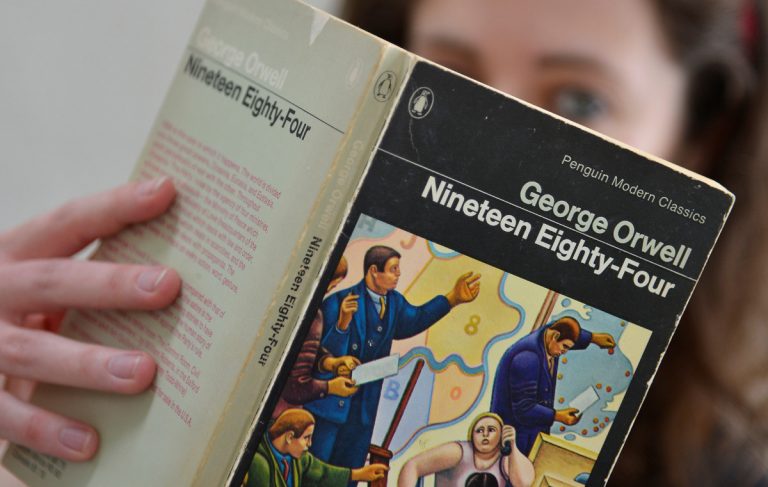
George Orwell’s classic dystopian novel, 1984, has long been a mainstay on the reading lists of high schools across the U.S.
Following the recent American election, however, which saw real estate tycoon Donald Trump being elected to the highest office in the country, students are now beginning to see some unsettling parallels between Orwell’s work of fiction and our current reality.
It’s been two weeks into the Trump administration, and already terms like “alternative facts” have filtered into the public consciousness.
#Alternativefacts sounds very Orwellian #newspeak @KellyannePolls 🤥 hs student read & know #GeorgeOrwell #1984 https://t.co/nr0vDf2VKu
— GomezPost213 (@Gomez01001) January 23, 2017
During an interview with the press, Counselor to the President Kellyanne Conway used the term to defend White House Press Secretary Sean Spicer’s false statement that Trump’s inauguration had seen “the largest audience to ever witness an inauguration, period, both in person and around the globe”.
Sound familiar?
High school teachers are saying that their students are pointing out the eerie similarity between Conway’s “alternative facts” to the “doublethink” used by the ruling government in the book.
In the novel, “doublethink” is the acceptance of two contradictory ideas or beliefs at the same time. In Conway’s case, she attempted to equate a blatant lie as merely a different form of fact.
High school students reading "1984" see a mirror, not science fiction https://t.co/veuYz5ehf2 pic.twitter.com/kHyDiC1Wx1
— HuffPost (@HuffPost) February 3, 2017
In a Huffington Post report, Michigan teacher Mike Becker said: “There’s less shock compared to years past. A lot of students came up to me in the last few weeks and said stuff along the lines of ‘We’re living in 1984.’”
Published nearly 70 years ago, 1984 is set in a society controlled by a totalitarian government known as “Big Brother”, which keeps its citizens in line with constant surveillance. The story’s protagonist works for the Ministry of Truth, which disseminates the government-approved version of events.
Since Conway’s comments, the book has seen a resurgence in popularity, flying off the shelves at bookstores and rising to the top of Amazon’s bestseller charts.
Four books that should be required reading for this administration: 1984, Fahrenheit 451, The Handmaid's Tale, Brave New World #resistoften
— Artie @ THOSE (@bluerazzblowpop) January 26, 2017
Becker has been teaching 1984 to his students for over six years, and noted that while his students, who live in a predominantly pro-Trump county, are able to identify real-life examples of concepts found in the book, they didn’t appear to be too bothered by the idea of an all-seeing government.
He pointed out: “We self-monitor through things like social media, Snapchat, Instagram. We have these mini-cameras in our pocket.
“That becomes so common for them, I think, on a daily level on that scale [that] the vast complexity scale of government surveillance doesn’t really frighten them as much.”
On the other side of the country in Oregon, fellow educator William Milburn said his students, comprising a diverse group of students in a progressive society, are drawing different conclusions compared to Becker’s students.
“They are looking at comments Trump has made about voter fraud, Spicer’s comment about the inauguration, Kellyanne Conway’s ‘alternative facts,’ and it just rings so similar to them about doublethink and an authoritarian government fluttering our news with information ― some true and false ― but all of it exhausting in the long run,” said Milburn.
1984 is 2017’s surprise best-seller. It’s a good fit for the Trump era, but not perfect. https://t.co/ZldcyAoKyn
— Vox (@voxdotcom) February 2, 2017
He added that as the current cohort of students in high school were born around the time of the 9/11 terror attacks or soon after, which were followed by the U.S. wars in Afghanistan and Iraq, they could also relate to the idea of “perpetual war”.
However, Millburn found it inspiring that after reading and discussing the book, his students were becoming more concerned about the future and aware of the need to fight government oppression.
“A connection they’re also making to the story is about the importance of bravery, that it’s OK to question and challenge information that intuitively goes against our collective thoughts and beliefs,” he said.
Liked this? Then you’ll love these…
U.S. higher education likely to suffer as international scholars call for academic boycott
Trump more of a turn-off to international students than Brexit – study







